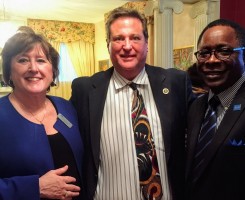“Forgive and forget”, that’s what they say. It’s good advice, but it’s not very practical. When someone hurts us, we want to hurt them back. When someone wrongs us, we want to be right. Without forgiveness, nothing is ever settled. Hurts never heal. And the most we can hope for is to forget. ~Henry Griffin, Unnatural History, 2010
If we were to look up the definition of forgiveness in the dictionary, we would find it defined in terms of: Amnesty, pardon, absolution, or remittal. But even though, by definition, the virtue of forgiveness promises a “clean slate” the offer remains highly subject to mistrust as Henry Griffin explains.
The topic of forgiveness carries unique meaning for each of us. Many have experienced the repair of relationships through the giving and receiving of forgiveness. Others have experienced hearing the words of forgiveness, but then experienced a negative change in the relationship.
The practice of giving or receiving forgiveness is a process calling us to communicate; to talk and listen with gentleness and understanding. Engaging in process helps us to stretch and grow, as we learn to be present with our own feelings and the feelings of others. Turning toward process, is to turn toward healing and repair, because without healing and repair, our choices are limited – to power plays, avoidance or dissolving relationships.
In our American culture today, we like to say we believe in the virtue of forgiveness, but in reality, our tendency is to merely give it lip-service, because we tell ourselves we are too busy to slow down and step into the process.
In our Western culture, emotional pain tends to be viewed through the lens of an “unwanted guest,” an interruption, or something to be rid of.
Consequently, the prescriptive advice we tend to hear from well-meaning and caring friends, is the sound bites telling us to “Move on” and “Get over it.”
Imperatives as these reveal the cultural preference to favor expediency, in contrast to a gentler process of offering ourselves time, to be present with our pain and honor our sorrow.
While the advice to “move on” or “get over it” is intended to be an encouragement, the studies in Interpersonal Neurobiology tell us that unresolved pain, emotional and physical, are responses of the sympathetic nervous system, signaling the need for attention.
If left unattended, resisted or pushed away, in an effort to try to “get over” or “forget” pain, we risk additional impairment to the operating styles of our physical, mental and emotional selves.
But what if we could understand forgiveness, as well as emotional pain, as an invitation to take care of ourselves, to allow ourselves time to experience healing, repair and reconciliation; personally, emotionally, spiritually, and relationally?
This past week marked the observance of Yom Kippur, or Day of Atonement, on the Jewish calendar. The holiest day of the year, it is the remembrance of God’s bestowal of forgiveness as petitioned by Moses, on behalf of the children of Israel for worshipping the golden calf.
It is also a day of reflection, to honor our relationship to the Holy, and to once again hear the message of forgiveness from YHWH.
In the Hebrew language, forgiveness is derived from the word kaphar, meaning to cover, to cancel, appease, cleanse, forgive, be merciful, pardon, purge or reconcile. We might say forgiveness is the key to restoring a relationship, “as if” there had never been an offense.
While we see the meaning of forgiveness described in a relational context with the Holy, the meaning is generalizable to each of us and our relationships. As a model for life, we have the freedom to extend and receive grace, mercy and loving-kindness, for ourselves and others, just as YHWH has to us.
And when we practice the process of forgiveness by extending grace, mercy and loving-kindness, we also have the opportunity to see hurts begin to heal and relationships begin to repair. And I don’t know about you, but that is something I don’t want to forget.
L'Chaim,
Paulette Jackson LPC-MHSP
photo credit: suzannebroadhurst.com













